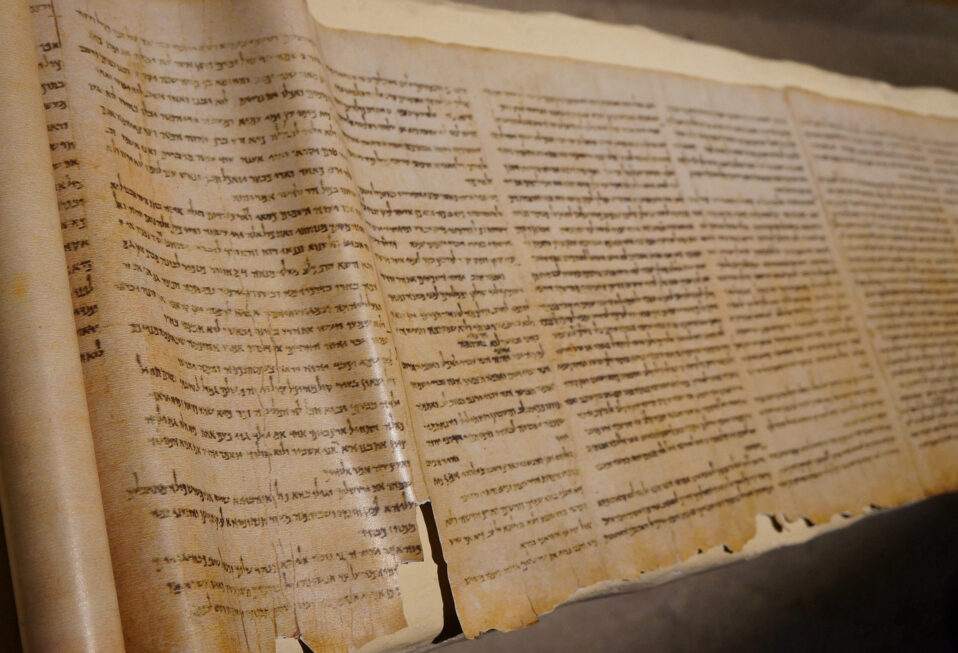The Dead Sea Scrolls are arguably the most significant archaeological discovery of the twentieth century. Why? What is their significance? To understand the significance of the Dead Sea Scrolls, we need to discuss their discovery and what comprises them.
Sometime in 1946 a young Bedouin boy discovered scrolls and pieces of scrolls in a cave along the northwest shore of the Dead Sea, near to an ancient ruin known as Khirbet Qumran. This began a search for scrolls within caves along the Dead Sea between Bedouin and scholars.
Manuscripts were discovered at places along the Dead Sea, Wadi Muraba’at, Nahal Hever, Masada, and Jericho, but the most concentrated discovery of scroll manuscripts came from eleven caves around the site of Khirbet Qumran. These eleven caves yielded approximately 30,000 fragments of manuscripts, which, when assembled, represent about 1,000 scrolls. These scrolls were written on animal skin, papyrus, and one even on copper. The majority were composed in Hebrew, some in Aramaic, and a few in Greek.
The Qumran scrolls date from the third century B.C. to the first century A.D. They represent the library of the community which lived at the site of Qumran. Most scholars identify this settlement as belonging to a Jewish group known from Josephus and other ancient writers known as the Essenes. The scrolls represent the library of this community; some were brought to the community and others were copied there.
The library divides into three groups:
- Biblical texts: This refers to the Jewish Scriptures known to Christians as the Old Testament. Every book of the Old Testament was found among the Dead Sea Scrolls, except for Esther. Scholars have recently suggested they identified a fragment of Esther, which, if true, means every book of the Old Testament was discovered among the Qumran library.
- Jewish non-sectarian literature: Fragments of Jewish works written outside of the Bible yet known within other contexts were discovered in the Qumran scrolls. Books like Tobit, Ben Sira, 1 Enoch, and Jubilees were discovered among the Dead Sea Scrolls. These works were preserved in translations into other languages, like Greek, Latin, and Ethiopic, but the Hebrew and Aramaic originals no longer existed. The Qumran scrolls provided Hebrew and Aramaic copies of these works. So too, other Jewish works not previously known, but not belonging to the Jewish sect that lived at Qumran were discovered among the scrolls. These provide important windows into ancient Judaism, its thoughts, beliefs, interpretations of the Bible, and practices.
- Sectarian scrolls: The settlement of Essenes lived at Qumran. This group produced their own literature which reflects their sectarian beliefs, theology, and expectations. These scrolls also provide an important window into the spiritual world of ancient Judaism.
These scrolls offer a treasure trove of information about ancient Judaism, the differences of interpretation, ideas, beliefs, practices, and expectations of redemption and the end. They offer a contemporary library to the world of the New Testament and what developed into rabbinic Judaism.
No book of the New Testament was found among the Dead Sea scrolls. So too, no character within the New Testament appears within the Dead Sea Scrolls. The amount of information the Dead Sea Scrolls provide to our knowledge and understanding of the world which birthed Christianity and rabbinic Judaism makes them one of the most significant discoveries ever.
Marc Turnage is President/CEO of Biblical Expeditions. He is an authority on ancient Judaism and Christian origins. He has published widely for both academic and popular audiences. His most recent book, Windows into the Bible, was named by Outreach Magazine as one of its top 100 Christian living resources. Marc is a widely sought-after speaker and a gifted teacher. He has been guiding groups to the lands of the Bible—Israel, Jordan, Egypt, Turkey, Greece, and Italy—for over twenty years.
Website: WITBUniversity.com
Facebook: @witbuniversity
Podcast: Windows into the Bible Podcast




Post a comment